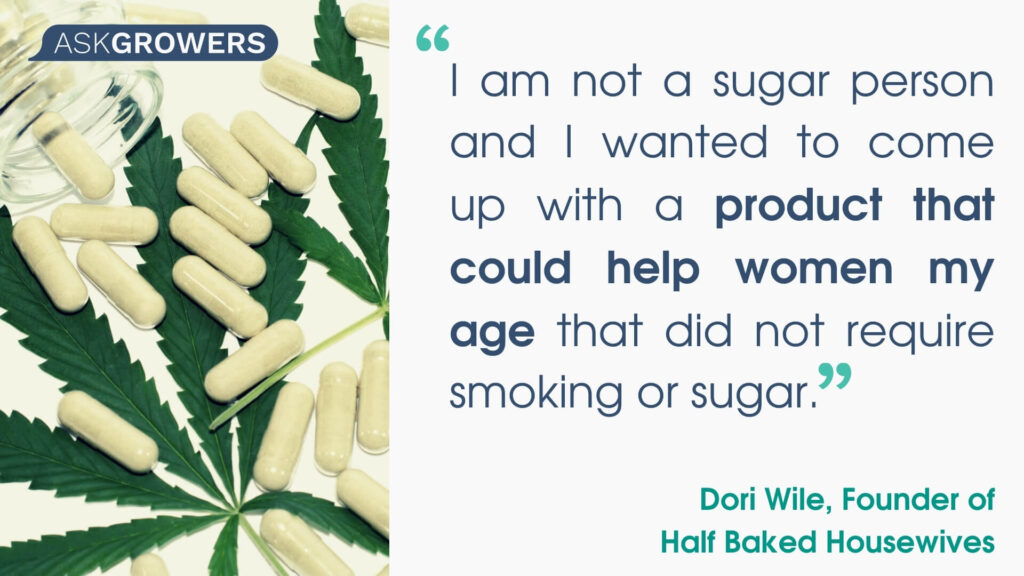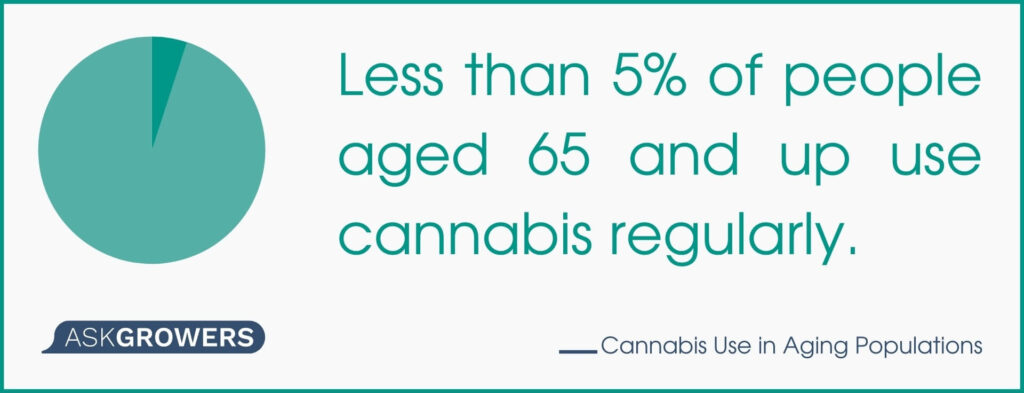This article by Lana Braslavkaia was originally published on AskGrowers, and appears here with permission.
It’s no real secret that the world of cannabis has benefitted from a major shift in approval in the last several decades. Emerging from the Regan era drug wars unscathed, recreational cannabis now enjoys broadened approval by most Americans.
According to the Pew Research Center, 91% of US adults believe that cannabis should be legal for recreational and medical purposes. Not only does this statistic indicate record approval ratings, but it also demonstrates that many people, once not strongly associated with cannabis have come to embrace it.
The elderly fall squarely into this category. The number of adults aged 65 and up who use cannabis nearly doubled between 2015-2018, and continues to rise even now. In this article, we explore why that is and what it means for the future.
The Situation
One of the main reasons that older people are moving towards cannabis is likely that the optics around it have shifted radically. While cannabis use was once considered a deviant behavior that carried with it public scorn and even the potential for legal ramifications it is now largely destigmatized.
The potential for legal jeopardy has also largely abated. Eighteen states (and counting) have legalized recreational cannabis use. Thirty-six states allow for medical cannabis, while twenty-seven states have decriminalized small quantities of the substance — effectively allowing citizens to use it without the threat of punishment.
For an older person who has historically abstained, the reasons for continued temperance have suddenly vacated.
Access may be another factor. Dispensaries of every variety tend to be common and accessible in the states where they are allowed. Physicians even bolster visits from the elderly community by moving continuously towards cannabis as a recommended form of treatment for certain ailments.
Indeed, it is worth pointing out that many symptoms for which cannabis is shown to be a good treatment show up most frequently in the elderly. Pain management, muscle spasms, and nausea are all ailments common to people of a certain age.
For the elderly person who once took a cabinet shelf full of powerful pharmaceuticals to relieve these afflictions cannabis may hold an appeal that extends far beyond the psychoactive properties for which it is well known.

Methods of ingestion have also diversified significantly, providing access to cannabis for people who may have historically been reluctant to smoke. Cannabis can now be vaporized, taken in pill form, absorbed topically, or eaten in pre-packaged foods prepared at dispensaries. The pill form is especially suitable for older people. Dori Wile says about her Delta-8 cannabis pills, “I am not a sugar person and I wanted to come up with a product that could help women my age that did not require smoking or sugar.”
Finally, elderly cannabis users have a vast array of options as it pertains to the form their cannabis usage takes. Potential users with an aversion to marijuana’s disorienting effect can still ingest cannabis in the form of CBD, or even by micro-dosing THC. In other words, grandma doesn’t have to “get high”, if she doesn’t want to.
All of this is to say that elderly people are making a much different decision in regards to cannabis than they were once given. Where before one had to weigh the prospect of acquiring the substance through an illicit source, and then subsequently consuming it in the stigmatized form of a “joint” they are now able to discuss the prospect safely with their doctor.
The Future
Unfortunately, cannabis suffers quite severely from a lack of long-term data. This scarcity of information is due largely to the fact that cannabis consumption was illegal for most of recent history. Therefore, modern science has had little opportunity to conduct the same research that has been extended to other chemicals being ingested by the mainstream population.
No one knows exactly what long-term effects cannabis will have on the elderly — or for that matter, anyone else. Presently, this lack of certified information has had a long history of cannabis-related rumors or misconceptions.
There is a lot we don’t know about cannabis, and therefore, much remains uncertain in regards to how suitable it is for elderly users. Does cannabis reduce the likelihood of disease? Increase it? Are the pharmaceuticals many elderly people have to rely on for pain management more harmful than regular THC intake?

It may be that the legalization and destigmatization of cannabis led to an increase in the elderly, but the answer to these questions, and more will likely have the biggest impact on its future. For now, the elderly population remains a relatively modest portion of cannabis users. Though the number is increasing, it remains true that less than 5% of people aged 65 and up use cannabis regularly. What part of the market share they will assume in the future remains to be seen.
Conclusion
It’s hard not to wonder what it means to have the elderly begin to assume a heightened role in the world of cannabis. For now, there are more questions than answers. However, it seems there is little doubt that, if trends continue in the direction they are going, elderly cannabis consumption will continue to grow at an accelerated rate.
It’s also worth noting that a more cannabis-friendly population is ever-aging into the 65 and up a bracket. While the advanced population of today grew up in an era of cannabis sparsity, and may indeed be considering the plant for the first time in their life, there will come a day when the elderly population is largely used to regular cannabis use.
One can hope that when that day comes, many of our cannabis questions will have been answered. For now, it remains the fact that older people have taken a keen interest in this substance that had previously been left neglected or even feared.
References
https://www.pewresearch.org/fact-tank/2019/11/14/americans-support-marijuana-legalization/
https://www.statnews.com/2020/02/24/cannabis-use-among-older-adults-is-on-the-rise-study-says/
https://www.ncsl.org/research/civil-and-criminal-justice/marijuana-overview.aspx
https://en.wikipedia.org/wiki/Medical_cannabis_in_the_United_States
© 2024 Benzinga.com. Benzinga does not provide investment advice. All rights reserved.
Trade confidently with insights and alerts from analyst ratings, free reports and breaking news that affects the stocks you care about.
Cannabis is evolving – don’t get left behind!
Curious about what’s next for the industry and how to leverage California’s unique market?
Join top executives, policymakers, and investors at the Benzinga Cannabis Market Spotlight in Anaheim, CA, at the House of Blues on November 12. Dive deep into the latest strategies, investment trends, and brand insights that are shaping the future of cannabis!
Get your tickets now to secure your spot and avoid last-minute price hikes.